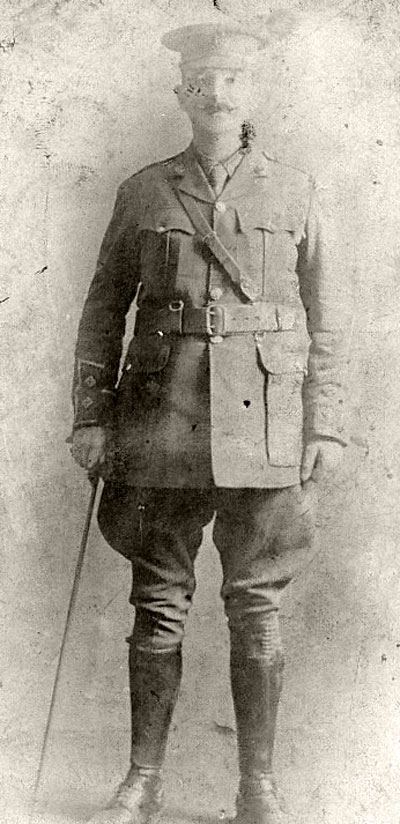Captain Thomas Henry Sherlock

Thomas Henry Sherlock was born on 1 March 1866 at Bandon, Cork, son of solicitor George Kingston Sherlock and his wife Annie Wyse Sherlock (nee Hornibrook).
He was educated at Bandon Grammar School and Wesley College, Dublin. Following study at university he qualified as a veterinary surgeon (MRCVS). He established a veterinary practice in County Louth, where he lived at Constitution Hill, Drogheda.
On 28 April 1915 he was commissioned as a lieutenant in the Army Veterinary Corps and a month later embarked for France, where he was attached to the 89th Brigade of the Royal Field Artillery. Over the following year he served at places including Bethune, La Gorgue, Forges-les-Eaux, Albert, Mametz and Westoutre.
In September 1915 at Festubert, probably during the Battle of Loos, he received a head wound and "gun shock". Sherlock was evacuated to the UK but fortunately his injuries were not severe and he returned to his unit in France at the end of November 1915.
On 28 April 1916 he was promoted to the rank of captain, having completed twelve months service.
On 23 July 1916 during the Battle of the Somme Sherlock was gassed by phosgene. The brigade diary for the day states:
Wagon line heavily shelled causing 14 O[ther] R[anks] to be wounded & 5 killed and had to move back to Becordel.
Sherlock was evacuated to the UK for treatment. Although he recovered, a medical board in November found him only fit for home service. He was posted to the 69th (East Anglian) Division, serving as veterinary officer to the 206th Infantry Brigade at Welbeck Camp, Retford.
In June 1917 Sherlock applied for a transfer to the Irish Command "owing to serious pecuniary losses in my private affairs, due to lack of occasional supervision which is impossible from here." An exchange was arranged with another officer and he reported for duty at the Station Veterinary Hospital, The Curragh, on 23 July.
He was later posted to Antrim, serving as a veterinary officer to the North Irish Horse reserve regiment until the end of the war. He also served at Enniskillen.
Sherlock relinquished his commission on completion of his service on 7 March 1919.
After the war he returned to his veterinary practice in Drogheda, County Louth.
He died at Navan, County Meath, in 1939.
Image kindly provided by Captain Sherlock's granddaughter Anne Kearney Farrelly.
